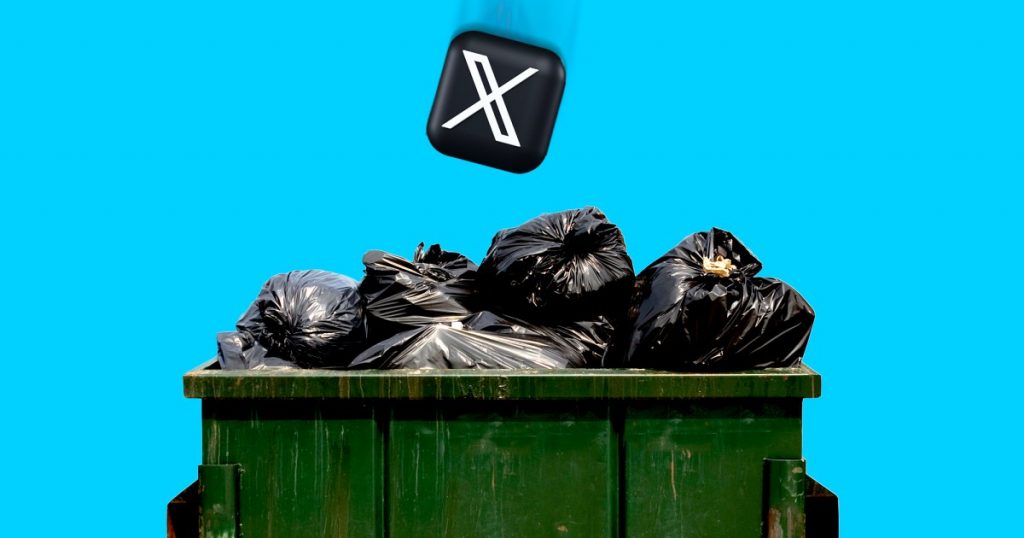Is Dumping Twitter Your New Year’s Resolution?
Mother Jones; Getty
Fight disinformation: Sign up for the free Mother Jones Daily newsletter and follow the news that matters.Ever since Elon Musk took over Twitter, people have occasionally asked themselves a question: “Is it okay for me to keep using this thing?”
For many users, Musk has made Twitter—or as it is now technically known, X—a moral question by committing increasingly irresponsible missteps. There was the time he was publicly duped by a fake conservative website into spreading a conspiracy about Paul Pelosi. He’s tweeted out racist dog whistles about Black people. Recently, he posted outright antisemitism, as his site becomes a haven for the far-right.
Most users have stayed. The site still hums with activity, and is still the closest thing to a place of centralized discourse. But the numbers show a substantial share have departed: some 15% of users left since Musk took over last October; ad revenue is down by 54% over the same period.
Staying does feel bad. Logging on to send little tweets while knowing you are playing some sliver of a part in enabling a petulant billionaire, however minuscule and indirect, is at a minimum embarrassing.
If you’re a journalist or believe in the mission of the Fourth Estate, it is especially embarrassing to keep posting on a platform where you know the owner has and will continue to denigrate the profession while actively trying to minimize its reach. There is an even more serious version of the problem if you’re Black or Jewish, two communities Musk has targeted.
At least a few people believe that it’s more than embarrassing; it’s deeply immoral. In an online exchange at the beginning of December among something of a whose-who of columnist men who write about tech, Ezra Klein wrote that he finds it “astonishing at this point” that journalists keep using Twitter: “To keep adding value to a platform that the owner is weaponizing for this kind of toxicity is not a neutral choice.”
“Absolutely blows my mind,” Christopher Mims, a columnist at the Wall Street Journal, replied in agreement, speculating that the reason that such reporters still use Twitter was “addiction to these services…I just can’t think of any other explanation at this point.”
Both Mims and Klein were responding to a post from Casey Newton, founder and editor-in-chief of the prominent tech newsletter “Platformer,” in which he criticized journalists for showing up on Twitter to “post their links there every day because maybe they’ll get more likes than they do on other websites.”
The irony of this exchange is that it took place on Threads, a Meta-owned platform. And of course, that company has its own problems. Back when it was still known as Facebook, the United Nations described it as having played a significant role by being a “useful instrument” for those seeking to spread hate in Myanmar during the genocide of Rohingya Muslims. Facebook may have also played a role in violence against ethnic and religious groups in Sri Lanka and during the Ethiopian civil war. Other links to human rights abuses have been documented, including how the service was leveraged by Rodrigo Dueterte’s regime in the Philippines to target dissidents.
Less concerningly (but still concerningly) Meta is blocking news on its Canadian sites in response to a law that would compel tech companies to pay publishers for news content posted on social media platforms. Lamenting that state of affairs on Threads, technology journalist Julia Angwin argued that she found it “shocking how quickly journalists are embracing this platform given that we know how hostile Meta is to news.” Indeed, Adam Mosseri, Instagram’s head of product, and their employee who seems to post the most about threads, has made no secret of Threads not prioritizing news and politics, in the name of avoiding “negativity.”
None of this is to say that Musk isn’t spreading toxicity, bad vibes, racism, bigotry, and throttling news. He is. It’s just that genocide and violence are also toxic. You could argue Meta’s higher body count is actually more toxic than the bad rhetoric Musk spreads that may eventually inspire violence.
Klein, Mims, and Newton have all departed from Twitter. But a lot of its biggest critics have not. Cory Doctorow, a prolific writer and thinker who has in large part staked out his career pillorying technology companies, continues to frequently post on Twitter, even as it gets visibly worse.
Doctorow told me over email that while he would be excited for and participate in an organized strike and mass exodus from the platform, he’s not particularly moved by individual, piecemeal departures.
“Twitter has gotten worse under Musk,” he acknowledged, but, pointing to Mark Zuckerberg, Doctorow argues “Facebook’s leadership hasn’t changed, and it *also* got worse.”
But Facebook’s leadership did change: COO Sheryl Sandberg had made efforts to rectify its problems with diversity and the potential harms its platforms could incur on marginalized communities, but she stepped down in 2022. The company has also backtracked on moderating false claims about the 2020 election. It has been accused of laying off its team tasked with overseeing posts from Africa following complaints of low pay and lacking mental health support for the intense work of content moderation. It continues to vacuum up data from its users with little government oversight.
To Doctorow, this all means there’s little to be gained in preferring a Meta platform over one owned by Musk. “These fragmentary, purity-culture-driven efforts to say, ‘You should be a source of income, surveillance data and AI training for Mark Zuckerberg, not Elon Musk’ is a distraction from the real work,” Doctorow said.
Versions of this have played out in tech before. After Uber’s predatory labor practices entered mainstream discourse, many people thought they might improve things by instead using Lyft. The net effect was arguably insignificant, and users returned to Uber. And in the end, both companies still rely on classifying drivers as independent contractors to finesse their way out of paying benefits or consistent salaries. The net pay for drivers on both apps is abysmal. The companies still collect large amounts of data about customer travel, mostly uninhibited.
“The neoliberal obsession with figuring out how to personally lead a life that is free from sin—rather than seeing yourself as part of a polity that counters the forces of capital as a movement that demands systemic changes—means that we spend all our time arguing about whether we’re bad people for being on Meta or worse people for being on Twitter,” Doctorow said.
In other words, the argument over which platform is worse, if it happens on either of them, is still helping line some tech billionaire’s pocket.





